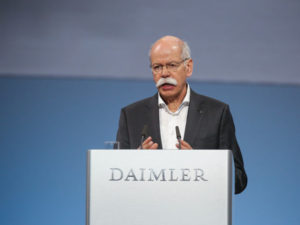German carmakers to cut NOx from over 5m diesel cars
BMW, Daimler, Opel and Volkswagen are to offer free software updates for more than five million cars in Germany, claimed to cut NOx emissions by up to 30% and likely to signal similar programmes across Europe.

Daimler chairman, Dieter Zetsche.
The action was agreed at a Diesel Forum held yesterday (2 August) in Berlin, presided over by German government and automotive industry officials, which looked at ways to regain consumer trust and avoid diesel bans.
Updates will be provided free of charge to end-users, subject to approval by road traffic authority Kraftfahrt-Bundesamt (KBA) which stipulates that they must not affect the performance, fuel consumption or service life of the engines. The cost will be absorbed by the carmakers.
The carmakers have also agreed to scrappage incentives for Euro 4 vehicles. BMW has confirmed that owners of diesel vehicles that meet Euro 4 standards or less will be granted an environment bonus of up to €2,000 when trading in for a new BMW or MINI.
In an official statement on the diesel upgrades, Daimler chairman Dieter Zetsche said: “We focus on improving the diesel instead of banning it. In the medium term optimizing the diesel engine is one of the most effective levers for achieving climate goals through less CO2 in road traffic.”
He added: “I trust that today’s meeting will serve as a signal to make the debate about the diesel engine, which has gotten off track in some areas, objective again. I understand that many think the automotive industry is the problem. We will now show that we are part of the solution.”
The upgrades follow a report from Der Spiegel magazine alleging possible collusion between Volkswagen, BMW and Daimler over technology relating to exhaust gas measures on diesels, which BMW continues to categorically reject.
The last week has also seen a German judge demand that a diesel ban be implemented in Stuttgart from 2018 after ruling that the local government’s draft air quality plan wouldn’t be tough enough to tackle illegal levels of pollution and said retrofits were an inadequate solution.
However, environmental organisations slammed the move as “pitiful” and a “greenwash”.
Lawyers at ClientEarth, which has taken legal action with German organisation DUH over air pollution in several German regions including Stuttgart, discredited the upgrades.
Clean air lawyer Ugo Taddei said: “This is a pitiful attempt by a discredited car industry to get itself off the hook for creating an endemic problem. The solution proposed is far too little, far too late.
“The retrofit would cut NOx pollution by a maximum of 30%. That’s a drop in the ocean, considering that Euro 5 and Euro 6 diesel vehicles emit on average 5 to 7 times more NOx than the legal limits.’
And environmental NGO Transport & Environment (T&E) accused the summit of missing an opportunity to incentivise the uptake of electric vehicles by investing in charging points and other measures while hampering diesel purchases by removing lower excise on diesel fuel and lower vehicle taxes for diesel cars while also introducing charges for using diesels in cities.
The organisation added the software upgrade “is a welcome stop-gap measure to help alleviate diesel-choked cities – but this is not a long-term solution to the air pollution crisis. Nor will it make diesel clean.”
T&E also called for a new Euro 7 standard that “ends new diesel cars’ licence to pollute” and said that in the interim, city bans on diesel vehicles will still be needed during episodes of high pollution and where air pollution limits are breached.
Cap HPI has already stated its view that the previously announced Daimler and Audi upgrades won’t affect residual values.
Andrew Mee, senior forecasting editor (UK), said: “Recalls are fairly common and cover a host of fixes. The recent headlines made by Mercedes and Volkswagen Group are understandable given the level of news coverage on the diesel issue. However, the main drivers of future values are still based around available volumes and potential demand in the market as a whole.
“While current values may see a short term dip, the longer term forecast often sees a smoother and more predictable trend over three to four years. Diesel registration share has been in slight decline since 2012, with the decline increasing from 2014 and this gradual decline is expected to continue. Similarly, in the smaller car sectors, we are seeing the long standing premium that diesel vehicles commanded erode over time, and we expect this trend to also continue.”

